- Home
- Alice Walker
Taking the Arrow Out of the Heart
Taking the Arrow Out of the Heart Read online
Thank you for downloading this Simon & Schuster ebook.
* * *
Get a FREE ebook when you join our mailing list. Plus, get updates on new releases, deals, recommended reads, and more from Simon & Schuster. Click below to sign up and see terms and conditions.
CLICK HERE TO SIGN UP
Already a subscriber? Provide your email again so we can register this ebook and send you more of what you like to read. You will continue to receive exclusive offers in your inbox.
En recuerdo de Coretta Scott King
generosa y noble
radiantemente sonriendo;
feliz.
Antes de que la flecha acertara.
Remembering Coretta Scott King
generous and kind
brightly smiling;
happy.
Before the arrow struck.
Y, con respeto, para David Icke
ese “loco”;
que conecta puntos, encuentra flechas,
las saca también
cuando la gente ayuda.
And with respect, to David Icke
the “mad” one;
connecting dots, finding arrows,
removing them too
when people help.
Y para todos los de nosotros que alguna vez hemos caído:
que nos hemos sacado la flecha
en ocasiones muchas veces
y nos hemos levantado
de nuevo.
And for all of us who have ever fallen:
who have removed the arrow
sometimes many times
and stood up
again.
If we want a better world, we have to make it ourselves.
—A. W.
Si queremos un mundo mejor, tenemos que hacerlo nosotros mismos.
—A. W.
Introduction
* * *
No one escapes a time in life when the arrow of sorrow, of anger, of despair pierces the heart. For many of us, there is the inevitable need to circle the wound. It is often such a surprise to find it there, in us, when we had assumed arrows so painful only landed in the hearts of other people. Some of us spend decades screaming at the archer. Or at least for longer periods than are good for us. How to take the arrow out of the heart? How to learn to relieve our own pain? That is the question. Like many such questions it is delved into by Buddhism, but also by anyone who has lived long enough to see—by trial and error, for the most part—that the futility we begin to feel, as we attempt to bring down the archer, leaves our wounded heart untended, and the medicine of Life that abounds wherever we are is left unapplied.
Taking the Arrow Out of the Heart was not the original title of this new book, poems written mainly in 2015–2016. It was a time of great sadness and feelings of loss and despair. Worse to face, as now, are the brutal murders of children, the deliberate starving and abusing of them. The callous trampling on their rights as human beings, however small, and the brutal indifference (as they must experience it) of the grown-up world. Entwined with this is the abuse of the planet, the literal draining of her blood, the carving up for profit of her very flesh and bone.
And yet, there are those of us humans who have stood up, wherever we could stand up, in defense of children, animals, the earth, and we have had ancestors before us who have done the same. Which is how we learned. One such ancestor was Muhammad Ali. That fierce, indignant poet of words and fists. Though he was not alone. This book originally carried a title celebrating his courageous walk through a challenging life, and a battered but triumphant exit from it: The Long Road Home.
I still love this idea—that to remain on that road “home” to the truest self we can muster is a knockout in the ring of life. And to achieve, even to approach, or get on that road home! Maybe to actually get your whole self there . . . this would be bliss beyond imagining. For then we would surely join the Immortals: those who laid out the path as best they could for us, by their example. Which, in so many instances, was all they had. Imagine. Owning only the example of one’s behavior. When applied to our people and to so many peoples we are now discovering, we begin to see our inherited riches. Our inherited wealth. It is the road itself.
But life will change course. And so I was invited to give a talk at a university and the instruction that rose again and again in me from the Source that always knows how plagued with doubt and confusion and guilt humans are, was “talk to them about how that arrow many feel in their hearts is not theirs alone. Remind them it is worthwhile to train to learn how to remove it.”
I understood this. Because, indeed, the long road home has many archers waiting in ambush. This reality is part of what keeps the drug industry flourishing. Here, as a poet, I intervene.
Introducción
* * *
Nadie escapa a un momento en la vida en que la flecha del dolor, de la ira, del desespero se clava en el corazón. Para muchos de nosotros, existe la inevitable necesidad de rodear la herida. Resulta con frecuencia una gran sorpresa hallar la herida ahí, en nosotros, cuando habíamos supuesto que flechas tan dolorosas solo penetraban en los corazones de otros. Algunos de nosotros pasamos décadas gritándole al arquero o, al menos, períodos más prolongados de lo que es bueno para nosotros. ¿Cómo sacarse la flecha del corazón? ¿Cómo aprender a aliviar nuestro propio dolor? Esa es la cuestión. Como con tantas otras interrogantes, el budismo ha ahondado en ella, pero también lo ha hecho cualquiera que haya vivido lo suficiente para ver —por ensayo y error, sobre todo— que la inutilidad que empezamos a sentir a medida que intentamos derribar al arquero, deja desatendido a nuestro herido corazón y la medicina de la vida, que tanto abunda dondequiera que estemos, queda sin aplicarse.
Taking the arrow out of the heart (Sacarse la flecha del corazón) no era el título original de este nuevo libro, poemas escritos principalmente en 2015 y 2016. Fue una etapa de enorme tristeza y de sentimientos de pérdida y desesperanza. Lo cual empeoró al enfrentar, como ahora, el brutal asesinato de niños y la forma deliberada en que los hacen pasar hambre y abusan de ellos. El cruel atropello de sus derechos como seres humanos, a pesar de ser pequeños, y la salvaje indiferencia (tal como deben experimentarla) del mundo adulto. Entrelazados con esto, la devastación del planeta, el drenaje literal de su sangre, la repartición con fines de lucro, su carne y hueso.
Y aun así, estamos aquellos de nosotros, los humanos que nos hemos alzado, dondequiera que pudiéramos hacerlo, en defensa de los niños, los animales, la tierra. Y hemos tenido antecesores que antes que nosotros hicieron lo mismo. Es así como hemos aprendido. Uno de tales antecesores fue Muhammad Alí. Ese feroz e indignado poeta de las palabras y los puños. Aunque no estaba solo. Este libro originalmente llevaba un título que celebraba su valerosa marcha a través de una vida desafiante y una salida maltrecha pero triunfante de ella: The Long Road Home (El largo camino a casa).
Todavía me gusta esa idea: que quedarse en ese camino a casa al ser el más verdadero que podemos es un nocaut en el cuadrilátero de la vida. ¡Así como alcanzar, incluso acercarse o ponerse en ese camino a casa! Tal vez lograr realmente su ser completo allí… Esta sería una dicha más allá de lo imaginado, pues entonces nos uniríamos de seguro a los Inmortales: a esos Alí y Martin y Fannie Lou y a nuestras madres y padres que trazaron la senda lo mejor que pudieron para nosotros mediante su ejemplo. El cual, en tantos casos, fue todo lo que tuvieron. Imaginen. ¡Poseer solo el ejemplo de la conducta de uno! Cuando se aplica a nuestro pueblo y a tantos otros pueblos que ahora descubrimos, empezamos a ver nuestras riquezas heredadas. Nuestra fortuna. Es el camino en sí mismo.
Pero la vida cambiará el rumbo. Así, fui invitada a dar una charla en una universidad y la
recomendación que surgía una y otra vez para mí de la Fuente que siempre sabe lo plagados de dudas y confusión y culpa que están los humanos fue “háblales sobre cómo esa flecha que muchos sienten en su corazón no es suya solamente. Recuérdales que vale la pena prepararse para aprender cómo sacársela”.
Lo comprendí. Porque, de verdad, el largo camino a casa tiene muchos arqueros que aguardan emboscados. Esta realidad es parte de lo que mantiene floreciente la industria de la droga. Aquí, como poeta, intervengo yo.
A Note about the Translator
* * *
by Alice Walker
I met Manuel García Verdecia at the Havana Book Fair in 1985. He is a well-loved and much-respected poet and writer in Cuba and also the translator of several of my books, which have always done well in Cuba. Cubans are voracious readers, and I was astonished at the huge numbers of people, of all ages, streaming into what had once been a barracks of sorts, during the dictator Batista’s regime, and now was the site of Che Guevara’s former office, turned small auditorium, where my reading was to be held.
But something else has stayed with me even more profoundly than this: A group of us, all hopeful revolutionaries, evolutionaries, lovers and artists of various kinds, had gone out to lunch together, after celebrating the morning’s reading, which had gone well, though my Spanish, to this day, and having “lived” in Mexico part of each year since the eighties, has never left the beginner’s stage. At some point I got up to go to the bathroom. We had been eating and drinking so merrily it was hard to tear myself away. Still, I managed to move toward the door. But as I approached it, I turned and looked back at those I left. They were all looking toward me. Our eyes met. And I looked deeply into each of them. Each of the eight or so beings. I realized that by some ineffable grace I had met up with a band of true soul mates. There was a luminosity to the moment that went straight to my heart. And soul. None of us could imagine how many defeats lay ahead of us: to their revolution, to my “success” as a mother, and as an artist attempting to bring light, but we knew we were the ones offering ourselves to the journey, the task of trusting each other as companions on the Way.
It was one of the most luminous, and numinous, moments of my life. And though I am extremely forgetful, which has more to do with my nature than with age, I have never forgotten this moment of bonding with these gallant and awakened souls of Cuba. Manuel García Verdecia, who was at that table, and whom I have seen only once more, fleetingly, all these years, has become the brother I am always expecting to find, no matter how foreign the land. We work together as if we share the same mother. Which of course we do.
Nota sobre el traductor
* * *
por Alice Walker
Conocí a Manuel García Verdecia en la Feria Internacional del Libro de La Habana en 1985. Es un poeta y escritor muy querido y respetado en Cuba, así como también el traductor de varios de mis libros que tienen buena aceptación en Cuba. Los cubanos son lectores verdaderos y quedé asombrada ante la enorme cantidad de personas, de todas las edades, que inundaban lo que fuera otrora un tipo de barracas para soldados durante el régimen del dictador Batista, y luego la sede de la oficina del Che Guevara y ahora un pequeño auditorio donde tendrían lugar mis lecturas.
Pero además algo ha perdurado conmigo aun más profundamente que esto: un grupo de nosotros, todos revolucionarios esperanzados, amantes y artistas de distintos tipos, habíamos ido a almorzar juntos tras realizar la lectura de la mañana que había salido bien, aunque mi español, hasta el día de hoy y aun habiendo vivido en México parte del año desde los ochenta, nunca ha pasado del nivel de principiante. En algún momento me levanté para ir al baño. Habíamos estado comiendo y tomando tan alegremente que era difícil apartarme de allí. Aun así, me las arreglé para encaminarme hacia la puerta. Pero al acercarme a esta, me volví y miré hacia los que dejaba atrás. Todos miraban hacia mí. Nuestros ojos se encontraron. Miré intensamente a cada uno de ellos, a cada uno de los más o menos ocho seres. Me percaté de que, por alguna gracia inexplicable, había hallado un grupo de verdaderas almas gemelas. Había una luminosidad en aquel momento que penetró directamente en mi corazón. Y en mi alma. Ninguno de nosotros podía imaginar cuántas derrotas nos esperaban por delante: a su revolución, a mi “éxito” como madre, y como artista que intentaba ofrecer luz, pero sabíamos que éramos nosotros quienes nos brindábamos para el viaje, en la tarea de confiar unos en otros como compañeros de camino.
Fue uno de los momentos más luminosos y numinosos de mi vida. Y aunque soy olvidadiza en extremo, lo que tiene que ver más con mi naturaleza que con mi edad, nunca he olvidado ese momento de vinculación con estas almas gallardas y conscientes de Cuba. Manuel García Verdecia, que estaba en la mesa, y a quien solo he visto una vez más, fugazmente, en todos estos años, se ha convertido en el hermano que siempre espero encontrar, no importa en qué extraña tierra. Trabajamos juntos como si hubiéramos salido de la misma madre. Lo que por supuesto es así.
Translating Alice Walker: A Work of Intellectual and Spiritual Growth
* * *
Translating into Spanish some of the works by author Alice Walker has been one of the most enlightening events of my life. It has given me the opportunity to allow other people to gain access to an extraordinary body of feelings and ideas about human beings and all that shapes or troubles their lives as present in her literary pieces and thus to expand the range of influence of her work. Also it has enriched the substance of my life as a person and a writer. She has such a broad, deep, and coherent outlook on life and art that working with her means engaging in a marvelous adventure of personal growth. Translating her works has turned into a fantastic literary, human, and spiritual experience.
From the literary standpoint it has meant getting close to her way of conceiving and developing her literary work. She has been constantly showing me that poetry is everywhere around us, even in the most trivial or unnoticed things, because they all share or add something to the complex and total function and sense of life. So poems—which can be not just verses but pieces of prose and reflection as well—result from the finding of a proper, personal, and effective voice that can utter in a compelling and moving way the meaningful issues that the author finds behind ordinary and obvious phenomena.
Being such an extraordinary human being, she has helped me to reexamine this concept and see it in its wideness and interconnection. Being human from her viewpoint is to consider, accept, and love everything and everyone as part of a bigger fabric where each one of us is ingrained, and that will only function adequately if there is the knowledge and the will to work together in an intelligent and sensitive form for the achievement of values that enrich our human possibilities and ambitions. To be human is to reaffirm life in its complex and inexhaustible diversity, and that is precisely what Alice Walker does when she writes.
Finally, it has been a renewing spiritual experience that has given me more strength and confidence to believe in a curious, infinite, and interconnected universe that feeds, sustains, and gives meaning to me. Through the things she reveals in her works we get to know better the real sense of who we are and what we search for, and we achieve a better view of how ideas and feelings can help in the link we have with one another, with what is beyond, with the past and the future, which means what is eternal. That is, we discover the soul in its most comprehensive and interconnected essence.
Reading—and translating is a very meticulous and creative form of reading—Alice’s works helps us to regain our confidence in humans and in life and, as Cuban poet and hero José Martí wrote, “to have faith in human improvement.”
She reassures us in the conviction that we can get to live in a more decent and harmonious world. We can if we know; we know if we want; we want if we have the will; and we have the will if we find the way to be really and essentially human.
Manuel García Verdecia
Holguín, Cuba, March 2018
Traducir a Alice Walker: Una labor de crecimiento intele
ctual y espiritual
* * *
Traducir al español algunas de las obras de la autora Alice Walker ha sido uno de los sucesos más iluminadores de mi existencia. Me ha brindado la oportunidad de posibilitar que otras personas accedan a un extraordinario cúmulo de sentimientos e ideas sobre los seres humanos y además lo que conforma y dificulta sus vidas, tal y como se observa en los textos literarios de Walker, y de tal modo incrementar el horizonte de influencia de su obra. Así mismo, ha enriquecido la esencia de mi vida como persona y como escritor. Ella posee una perspectiva sobre la vida y el arte tan amplia, profunda y coherente que trabajar con ella significa involucrarse en una maravillosa aventura de crecimiento personal. Traducir sus obras se ha vuelto una estupenda experiencia literaria, humana y espiritual.
Desde el punto de vista literario ha significado acercarme a su manera de concebir y desarrollar sus textos. Me ha enseñado constantemente que la poesía está en todas partes a nuestro alrededor, incluso en las cosas más triviales e inadvertidas, porque todas ellas comparten o añaden algo a la función y el sentido complejos y totales de la vida. De modo que los poemas —que pueden ser no solo versos sino también obras en prosa y de reflexión— son el producto de encontrar una voz propia, personal y eficaz que pueda expresar de manera convincente y emotiva los aspectos significativos que un autor descubre tras los fenómenos ordinarios y obvios.
Al ser ella un ser humano tan especial, me ha ayudado a reexaminar este concepto y verlo en su amplitud e interrelación. Ser humano desde su punto de vista es considerar, aceptar y amar todo y a todos como parte de un tejido mayor en el que cada uno de nosotros se incrusta y que solo funcionará adecuadamente si existen el conocimiento y la voluntad de trabajar unidos de forma inteligente y sensible para alcanzar los valores que enriquecen nuestras posibilidades y aspiraciones humanas. Ser humano es reafirmar la vida en su compleja e inextinguible diversidad y esto es precisamente lo que hace Alice Walker cuando escribe.

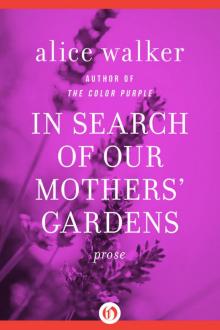 In Search of Our Mothers' Gardens: Prose
In Search of Our Mothers' Gardens: Prose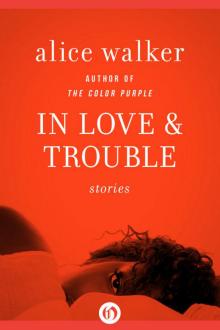 In Love and Trouble: Stories of Black Women: Stories of Black Women
In Love and Trouble: Stories of Black Women: Stories of Black Women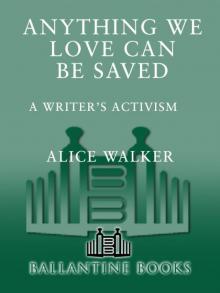 Anything We Love Can Be Saved
Anything We Love Can Be Saved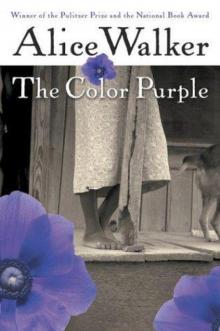 The Color Purple
The Color Purple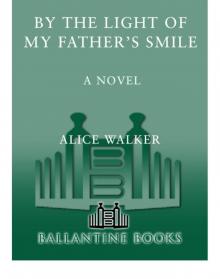 By the Light of My Father's Smile
By the Light of My Father's Smile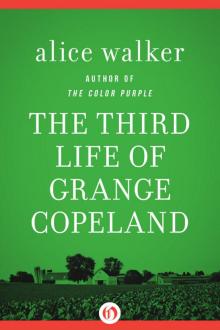 The Third Life of Grange Copeland
The Third Life of Grange Copeland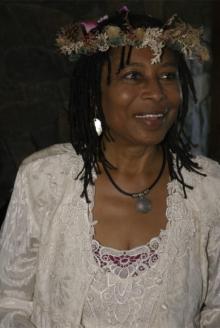 You Can't Keep a Good Woman Down
You Can't Keep a Good Woman Down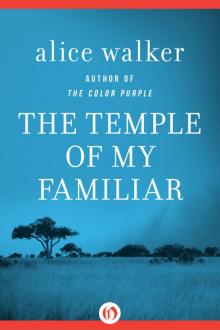 The Temple of My Familiar
The Temple of My Familiar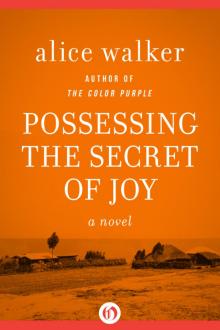 Possessing the Secret of Joy
Possessing the Secret of Joy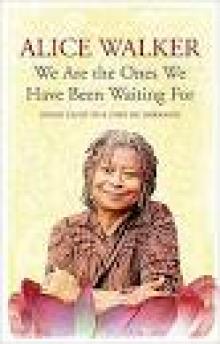 We Are the Ones We Have Been Waiting For
We Are the Ones We Have Been Waiting For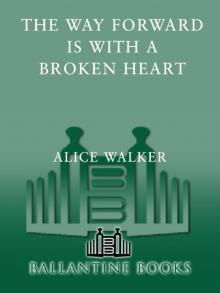 The Way Forward Is With a Broken Heart
The Way Forward Is With a Broken Heart Meridian
Meridian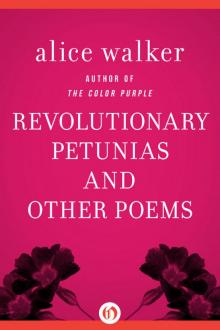 Revolutionary Petunias
Revolutionary Petunias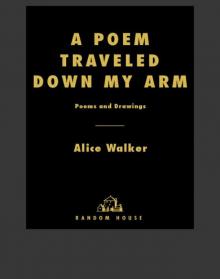 A Poem Traveled Down My Arm
A Poem Traveled Down My Arm Once
Once Horses Make a Landscape Look More Beautiful
Horses Make a Landscape Look More Beautiful Living by the Word
Living by the Word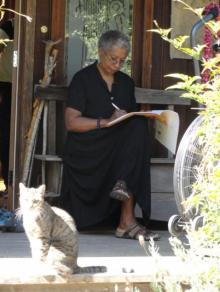 In Love and Trouble
In Love and Trouble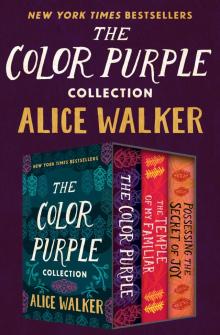 The Color Purple Collection
The Color Purple Collection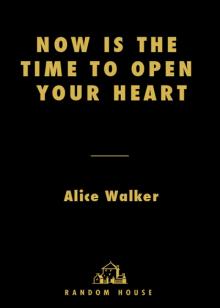 Now Is the Time to Open Your Heart
Now Is the Time to Open Your Heart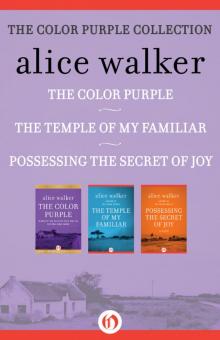 Color Purple Collection
Color Purple Collection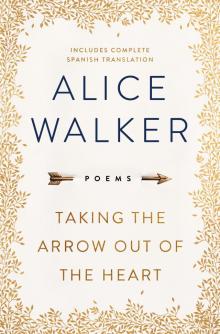 Taking the Arrow Out of the Heart
Taking the Arrow Out of the Heart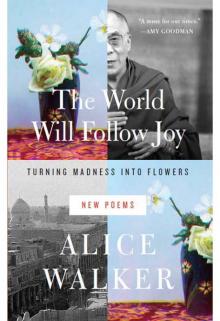 The World Will Follow Joy
The World Will Follow Joy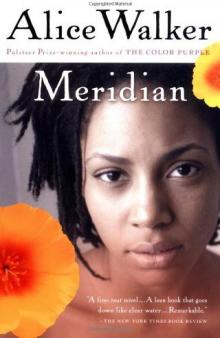 Meridian (1976)
Meridian (1976)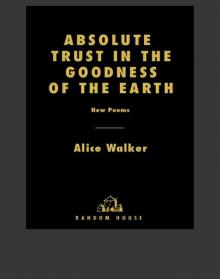 Absolute Trust in the Goodness of the Earth
Absolute Trust in the Goodness of the Earth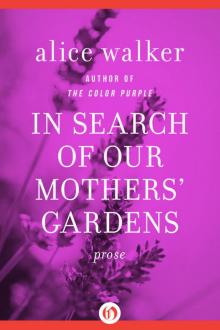 In Search of Our Mothers' Gardens
In Search of Our Mothers' Gardens